
This “Bone Poverty” Condition Affects Over 47 Million Americans
Miraculously, Hundreds of Senior Women Have Made ONE Small Dietary Change That Helped REVERSE It
The doctor walked into the room looking grave, “Noreen, let’s go over these test results together…”
Over the last couple of weeks, Noreen had noticed some alarming changes…
She wasn’t as balanced as she used to be and found herself tripping over the slight edges of carpets or when lifting her feet to go up a staircase...
Her lower back and hips constantly ached, making her uncomfortable throughout the day and unable to sleep at night…
And it might sound crazy, but she was starting to feel… shorter?
She knew whatever was happening wasn’t going to go away on its own…
But was still shocked & confused when her doctor shared the results of her bone scan: “Osteopenia.”
Immediately, questions began to race through her mind…
What in the world is osteopenia?
How is it different from osteoporosis?
And most importantly—what do I do about it?
If You’ve Been In Noreen's Position, You Know How She Felt At That Moment…
If You’ve Been in Noreen’s Position,
You Know How She Felt at That Moment…
And you’re not alone -- this devastating bone condition affects over 47 million Americans today.
Fortunately, just two years later, Noreen was able to say…
“The scan I had today showed NO osteopenia!
I didn’t take ANY medications…
Really, I only started doing ONE thing differently, so that must’ve been what it was!”
And she’s not the only one that’s noticed a DRASTIC improvement:
Mary Helen Jost from Lenoir City, Tennessee,
“I would say that the #1 reason I started was to help the soreness in my knees.
I do believe putting this in my coffee has helped not only my knees but general well being.
I began several years ago with one scoop but recently in 2021 began putting two scoops in my morning cup of coffee… Doing well at 86 years but cannot say how I would be without it. Don’t intend to stop!”
Judi Copley-Eyrick from Evansville, Indiana,
"I'm 73 years young and I take 2-3 scoops a day. After 2 weeks, I've already noticed weight loss, stronger nails, less hair loss, my skin is healthier, very little bruising when I bump into things, and moisturizing hands & face.
My DEXA (osteopenia) has remained stable, my digestion has greatly improved, and I'm already feeling more energized! I can hardly wait to see how I'll feel in 2 more months! Just try it for 3 months.
What do you have to lose?"
Nancy Monta from Cambridge, Maine,
“I have osteopenia, but I have been making this one change for a month now and notice I can walk 5 miles uphill without muscle or knee aches...
Nothing else has worked like this before!”
But before I tell you more about the one wondrous solution these women used to not only REBUILD their bones…
But also improve their balance…
Strengthen supporting muscle & tissue…
And ERASE their fears of falls, broken bones, and lost independence…
Let’s Answer One BIG Question:
What IS Osteopenia?
We break it down like this:
‘Osteo’ means “related to bones” and ‘penia’ means “poverty.”
Thus, osteopenia (like osteoporosis) tells you you have “poor bones.”
Bone mineral density (BMD) is how this is measured…
Telling you the strength and thickness of your bones...
And even more crucial: whether they’re at risk of future fractures.
You can think of bone mineral density as a slope—with the top being standard (healthy bones) and the bottom being osteoporosis (unhealthy bones).
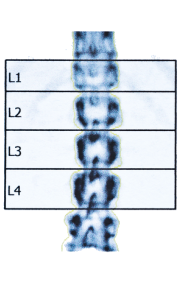
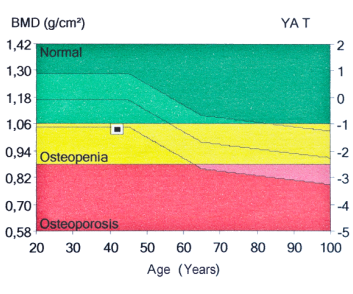
Osteopenia, which affects more than 52% of women over 50, falls somewhere in between.
Unfortunately, women are more susceptible to developing osteopenia due to menopause & lowered estrogen levels.
You learn about your bone density by getting a DEXA scan—a dual-energy X-ray absorptiometry.
It’s an inexpensive, noninvasive, 10-20 minute test that helps diagnose bone-related health conditions…
And The National Osteoporosis Foundation recommends that you have one regularly if you’re:
- a woman age 65 or older
- younger than 65, postmenopausal, and have one or more risk factors
- postmenopausal and you’ve broken a bone from normal activity, like pushing a chair to stand up or vacuuming
Upon receiving your DEXA scan results, you get a “T Score” which compares your BMD to a healthy 30-year-old of the same sex.
The following chart can help you understand what it means.
Normal: Greater than or equal to -1.0
Osteopenia: -1.0 to -2.5
Osteoporosis: Less than or equal to -2.5
Severe Osteoporosis: Less than or equal to -2.5 (plus fragility fracture)
The Good News Is, Osteopenia Is Classified as a CONDITION, Not a Disease…
And with a tiny tweak to your routine--it is possible to stabilize your bone density and reduce your risk for bone fractures…
In essence, it is possible to REVERSE osteopenia.
Sandy Dufour did it in just one year:
“I’m 72-years-old. After two years and two scoops of this in my coffee a day, my doctor told me last year I no longer have osteopenia 🎉. “
Anita Sayle’s doctor was SHOCKED to find her bone density is improving with age:
“I recently had an osteoporosis test. My bone density was quite a bit higher than 10 years ago. I have been taking this for about 3 years. I was so surprised when I got my test results. This WORKS!”
And Robin Doll recovered from a terrible accident faster than ANYONE would have believed,
“I made this change about 2 years ago. Last April, I was in a pretty horrific car accident and had a broken sternum that they were impressed that at my age of 65 was a straight break and healed in about 3 weeks! They were also blown away by the fact that my collarbone was not broken or even cracked, and they were impressed with how strong my bones were at my age!!”
So, Why Does This Happen?
And What Can YOU Do To Stop It?
Plain and simple, the cause of osteopenia comes down to one thing: Aging.
Although there are a variety of factors that can speed up the process…
Like an estrogen deficiency, lack of resistance exercise, low collagen or vitamin D, etc.…
Aging is the most common factor in the equation -- and something you obviously can’t avoid.
As you can see from the image, even a healthy bone is porous.
Osteoporosis Stages
Healthy Bone
Osteopenia
Osteoporosis
Severe Osteoarthritis
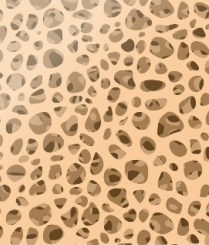



Throughout your life, your body is constantly absorbing and replacing bone tissue…
But once your bone mass peaks at around age 30, your body breaks down old bone faster than it creates new bone.
This means you lose more and more bone density with each passing year.
This is when osteopenia—and if unmanaged, osteoporosis—comes into play.
Thus, what your bones need is bone-building support.
The Simplest Way To Get That Support, You Ask?
Grass-fed collagen powder.
Collagen is the most abundant protein in your body—making up 33% of it.
However, once you hit about 25 years of age, collagen production begins to slow—declining by 1% with each passing year.
This means that by the age of 50, your collagen levels are slashed by HALF...
And one of the tell-tale signs of low collagen levels is joint pain, back pain, and weak bones…
Just like Noreen (and maybe you have) experienced.
The good news is, when you take a collagen supplement daily, you’re equipping your body (and bones) with what it needs to restore that bone loss…
Yes, it’s that easy -- and scientific studies prove it!
3 Science-Backed Ways Collagen Supports Bone, Joint & Muscle Health
Prevent Bone Loss
Our bones are made mostly of collagen, which gives them structure and helps keep them strong.
As collagen levels deteriorate with age, bone mass does too, leading to crippling mobility concerns including severely low bone density and higher risks of bone fractures.
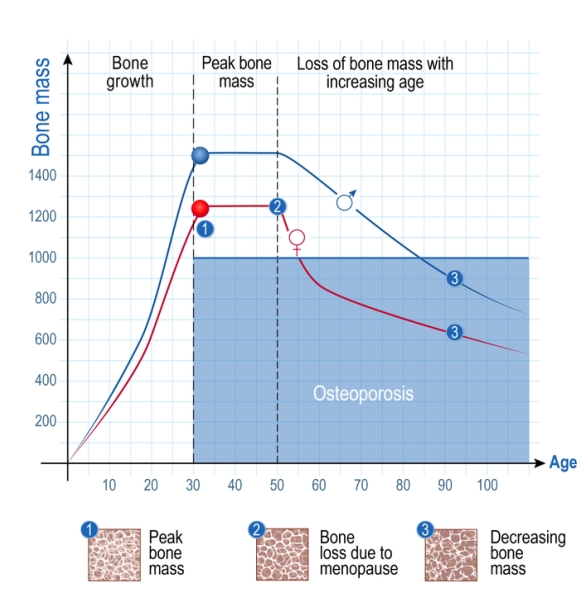
Bone Mass & Age
Studies have shown that taking collagen supplements may have certain effects in the body that help inhibit the bone breakdown.
In one study that looked at bone health in 103 postmenopausal women, 66 women were given 5 grams of collagen daily for 12 months. The women who took the collagen had an increase of up to 7% in their bone mineral density (BMD), compared to women who did not consume collagen.*
According to this study, collagen supplementation was associated with a favorable shift in bone markers, indicating increased bone formation and reduced bone degradation.
SUMMARY: For stronger, healthier bones, research shows that at least 12 months of daily collagen supplementation (5 grams/day) is required.
Relieve Joint Pain
Collagen helps maintain the integrity of your connective tissues such as our joints, muscles, and cartilage, which is the rubber-like tissue that protects your joints.
As the body’s collagen levels decrease with age, the risk of developing degenerative joint disorders increases.
Some studies have shown that taking a collagen supplement may help improve symptoms of joint disorders and reduce joint pain overall.
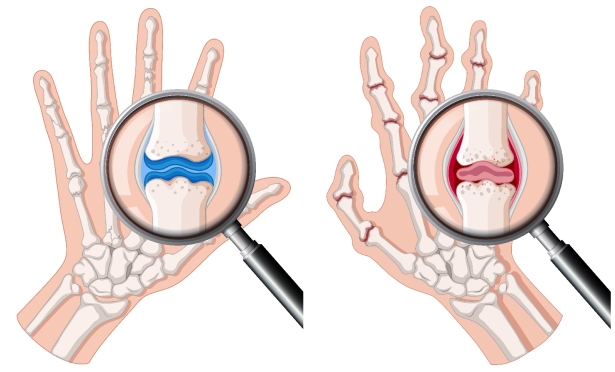
In one study, 73 participants who consumed 10 grams of collagen daily for 24 weeks experienced a significant decrease in joint pain while walking and at rest compared to a group that did not take it.*
SUMMARY: For improved joint health and relief from joint-related pain, research shows that at least 24 weeks of daily collagen supplementation (10 grams/day) is required.
Strengthen Muscles
Between 1–10% of muscle tissue is composed of collagen. This means that collagen protein is vital for keeping our muscles strong and functioning properly as we age.
Studies suggest that collagen supplements help boost muscle mass in people with sarcopenia, the loss of muscle mass that happens with age.*
In one study, 27 participants took 15 grams of collagen for 12 weeks. Compared to participants who did not take collagen, they gained significantly more muscle mass and strength.* This research shows great promise for helping older individuals maintain their independence as they age.
SUMMARY: Research shows that 12 weeks of daily collagen supplementation (15 grams/day) yielded improvements in muscle mass and strength.
Other Medically Proven Benefits of Collagen
Enhance Skin Complexion & Reduce Wrinkles
Collagen plays a role in strengthening skin, plus may benefit elasticity and hydration. With age, the body produces less collagen, leading to dry skin and the formation of wrinkles.
However, several studies have shown that collagen supplements may help slow the aging of your skin by reducing wrinkles and dryness.
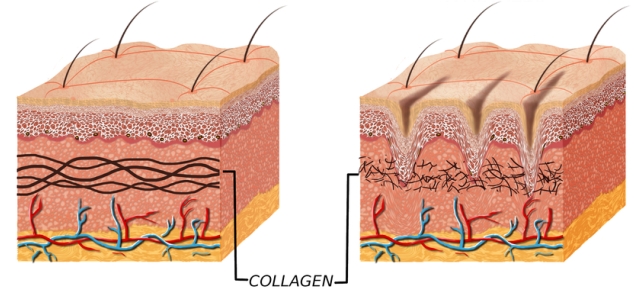
Good Skin
Bad Skin
One study found that women who consumed a collagen supplement daily for 12 weeks experienced increased skin hydration and a significant reduction in wrinkle depth compared to a control group.*
SUMMARY: While modest skin benefits can be seen in 8 weeks, for major improvements in skin health including reduction of deep wrinkles, research shows that at least 12 weeks of consistent daily collagen supplementation (5 grams/day) is required.
Improve Hair Health & Slow Follicle Thinning
Collagen makes up 70% of your dermis, the middle layer of your skin that contains the root of each individual hair. Therefore, providing the body with collagen may help maintain a healthy dermis and prevent hair thinning.
In an eight-week study, 69 women aged 35–55 found that taking a daily collagen supplement significantly improved dermis elasticity and hydration compared to a placebo, translating to enhanced overall skin & hair health.*
SUMMARY: When it comes to improving hair health, research shows that at least 8 weeks of consistent daily collagen supplementation (5 grams/day) is required for results.
Promote Heart & Artery Health
Collagen provides structure to your arteries, the blood vessels that carry blood from your heart to the rest of your body. Without enough collagen, arteries may become weak and fragile.
In one study, 31 healthy adults took 16 grams of collagen daily for six months. By the end, they had experienced a significant reduction in measures of artery stiffness compared to before they started taking the supplement.*
SUMMARY: According to research, 6 months of daily collagen supplementation (16 grams/day) was shown to elicit positive results for promoting heart health.
What the Research Clearly Tells Us Is That Collagen DOES Work Quite Miraculously—As Long As We Consume the Proper Amount on an Everyday Basis.
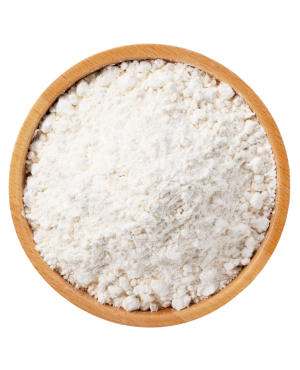
Based on clinical evidence, experiencing the many benefits of collagen may require anywhere from 8 weeks to 12 months of daily use to be fully realized.
Taking a scoop here and a scoop there won’t cut it when it comes to seeing results with collagen; consistent, daily use is necessary.
While it’s very possible to experience positive results as early as the first few weeks of consistent supplementation, and many of Dr. Chad Walding’s patients do, individuals aged 60+ may require longer durations of daily collagen use to experience dramatic results.
Generally, a daily collagen dose of 5-10 grams is recommended but for older individuals, their collagen levels are already at a deficit - putting them severely below normal healthy ranges.
This means doubling up the dose may be the best approach for older individuals to reap collagen’s maximum benefits; a protocol that’s better known as collagen loading.
“With collagen loading, my most successful senior patients take between 10-20 grams of collagen a day…”
Doubling the dose works to effectively rebuild lost collagen and allows the body to easily overcome the age-related deficit.
While some individuals may only need to “load” (10-20g daily) for a matter of months, many find the most success by using the loading dose long-term. This helps ensure that collagen levels stay elevated for good.
How To Get More Collagen in Your Diet
Now that you know a bit more about how much collagen your body really needs in order to experience results, you’ll also want to know the doctor-recommended approach to getting more collagen in your diet.
Though it is possible to obtain extra collagen through diet (consuming animal products such as gelatinous meats, the cartilage on bones such as chicken drumsticks, and skin from poultry), most find it unappealing or difficult to eat enough to support their body’s requirements.
Plus, the absorption is not as efficient as that of hydrolyzed collagen powder supplements. The collagen in supplements has already been broken down, or hydrolyzed, which is why it is thought to be absorbed more efficiently than the collagen in foods.
This is why supplementing with a high-quality collagen protein powder has become the preferred method for increasing collagen levels within the body. Most collagen powder supplements include a pre-dosed measuring scoop that makes adding more collagen to one’s diet seamless.
But not all collagen supplements are created equal...
“While skepticism surrounding collagen may remain for some time, there’s no denying its miraculous benefits - so long as you’re using the right formula to suit your needs.”
As more and more collagen supplements burst onto the stage, it’s important to understand the different types of collagen, as well as the different sources and health benefits associated with the most important types.
The Best Collagen Fiber Types For Seniors
Collagen types contain different proteins which serve separate purposes within the body.
However, most thoroughly researched specifically for anti-aging & mobility benefits are types I and III collagen.
These are frequently thought to be useful for the broadest number of people who are seeking to maintain an active lifestyle well beyond their 60’s.
Type I collagen, which is the most abundant collagen naturally found in the human body, is useful for visible anti-aging benefits such as:
- Getting rid of wrinkles
- Skin hydration & elasticity
- Wound healing, the formation of scar tissue
- Reduction in cellulite, possibly even stretch marks
- Moderate weight loss
- Gut lining & digestive health
Type III collagen, which is the second most prevalent collagen naturally found in the human body, is useful for physical anti-aging benefits:
- Muscle, ligament & tendon strength
- Restoring mobility within connective tissues
- Mitigating muscle soreness, aches & pains
- Bone & joint health
- Injury & fall prevention
Of all collagen’s health benefits, research is most certain about Type I and Type III’s ability to support ageless skin, hair, nails as well as effectively boost muscle, ligament, and tendon strength to support healthy joints as well as an active lifestyle.
Therefore when choosing a collagen supplement, it’s important to ensure Type I and Type III collagen is present in the formula.
What To Look For When Shopping For a Collagen Supplement
Based on recent clinical trials, there are 3 keys to getting the absolute best results with collagen supplementation.
#1.) Avoid “Multicollagen” Marketing Scams
While multicollagen supplements tend to be less expensive, there are a few key reasons why choosing bargain brand multicollagens may not be the smartest option for meeting your daily collagen needs.
For starters, research indicates that certain collagen types should be taken together while others should be taken separately.
For example, because collagen Type II protein makes up the fluids and function in the cartilage and joints, Type II collagen supplements should be taken separately from Types I & III to ensure adequate absorption.*
For this reason, taking multicollagen supplements that combine all the various types of collagen into 1 serving isn’t recommended as this will blunt the absorption, hindering the body from reaping the full benefits.
Additionally, many collagen fiber types that don’t have ample research backing their effectiveness are cheaper to source. These low-cost collagen types are often used in multicollagen supplements as fillers to mitigate manufacturing costs - ultimately yielding a far less effective supplement.
Therefore in order to experience maximum anti-aging results with collagen supplementation, use a powder that combines Types I & III - and leave out all the rest.
#2.) Make Sure Your Collagen Supplement Is Certified Grass-Fed
If you’ve considered supplementing with collagen then you probably already know that picking a collagen source can be a bit confusing.
Bone broth collagen, bovine-collagen, chicken-collagen, marine-collagen…
With so many options to choose from - how can you decide which is the best option for you?
Here’s what you need to know about the source:
It actually doesn’t matter as much as you think it does.
While the ratio and concentration of amino acids may vary slightly from source to source, structurally, collagen is the same whether it’s coming from a cow, chicken, fish, or bone broth.
The key difference maker to pay attention to isn’t the animal; it’s how the animal was cared for.
In other words, whether the collagen comes from a grass-fed, pasture-raised, cage-free, free-range, and antibiotic-free source, (or not), will have a direct impact on the absorption, effectiveness, and ultimately the safety of the supplement.
Grass-fed cows are never fed any genetically modified organisms and are not exposed to growth hormone treatment (rBGH & rBST), chemicals, antibiotics, or injected pathogens. This makes grass-fed collagen one of the healthiest (and safest) protein supplements to include in your diet. It is free of hormones, antibiotics, pesticides, and steroids.
The only way to ensure you are avoiding this risk of toxin exposure is by using a collagen supplement that is Certified Grass-Fed.
#3.) Look For “Hydrolysate” On The Label
To ensure your body can easily digest and put the collagen to immediate use, make sure the supplement is fully hydrolyzed collagen.
When hydrolyzed, collagen is carefully reduced to smaller, more digestible peptides during the manufacturing process.
Studies indicate that properly hydrolyzed collagen peptides are available in the bloodstream within two hours of ingestion.
In other words, using a hydrolysate collagen means your body will be able to start reaping the age-defying benefits much more rapidly.
Bottom Line: If You Are Interested in Trying Collagen, Doctors Agree That It’s Important To Choose Wisely…
Consuming pure Grass-Fed, Type I & III collagen fibers that are fully hydrolyzed for fast absorption will give your body a huge advantage when it comes to staving off joint pain as well as reducing visible signs of aging.
At NativePath, Dr. Chad Walding (DPT & Co-Founder) has played a critical role in developing a breakthrough formula to make meeting daily collagen needs easier and more effective than ever.
The Doctor-Recommended Collagen Formula
NativePath
Grass-Fed Collagen
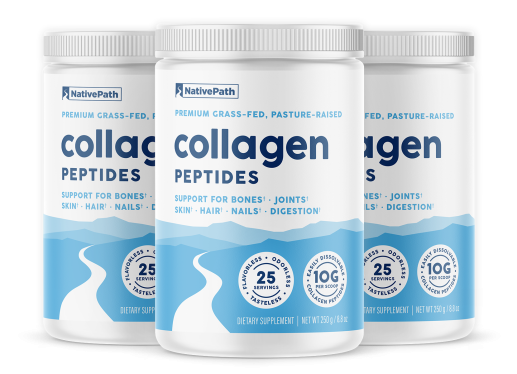
Supplementing with a premium collagen formula like NativePath Grass-Fed Collagen, which contains two targeted fiber types (type I & III), helps:
- Rebuild stronger bones and teeth
- Improve bone density (36% of bone is made up of type I & III collagen)
- Restore flexible, pain-free joints and cartilage
- Enhance skin hydration and elasticity for youthful-looking skin
- Promote thicker, fuller hair growth
- Nourish strong, durable nails
- Support digestive health and immune function
- Reinforce blood vessel lining and optimize cardiovascular function
Every scoop of NativePath Grass-Fed Collagen is consistently formulated with 10 grams of the highest-quality grass-fed, type I & type III collagen. Together, these two fiber types make up 90 percent of all the collagen in your body, making them critical for supporting the function of our bones, joints, skin, hair, blood vessels, digestion, immunity and so much more.
Using an advanced hydrolyzed collagen peptide technology, NativePath’s small-batch collagen formula allows for maximum absorption and potency.
This means it can be broken down, converted, and absorbed back into the body to rebuild joint and bone strength, fortify gut lining, improve immune activity and nourish skin and hair health much more effectively than non-hydrolyzed collagen brands.
Not to mention, dissolving faster, too.
As Low As $21/Jar For A Limited Time!
© 2024 NativePath
114 NW 25th St Unit #131 Miami, FL 33127
Toll-free: 1-800-819-2993

Disclaimer: The information on this site is not intended or implied to be a substitute for professional medical advice, diagnosis or treatment. All content, including text, graphics, images and information, contained on or available through this web site is for general information purposes only. NativePath makes no representation and assumes no responsibility for the accuracy of information contained on or available through this web site, and such information is subject to change without notice. You are encouraged to confirm any information obtained from or through this web site with other sources, and review all information regarding any medical condition or treatment with your physician.